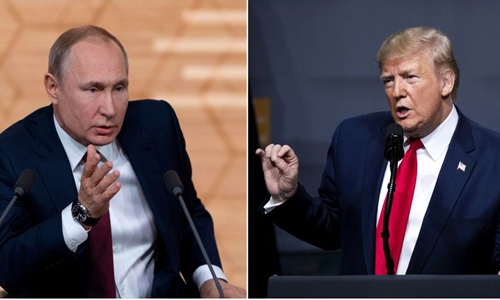Trump unable to change rocky US-Russia ties
By Cui Heng Source: Global Times Published: 2020/8/20 15:58:40

Xinhua file photos of Russian President Vladimir Putin and U.S. President Donald Trump
US President Donald Trump has told aides that he'd like to hold an in-person meeting with Russian President Vladimir Putin before the November US presidential election, according to an NBC News report.
The news has not been finally confirmed, but inviting Putin to visit the US is in line with Trump's intention to improve US-Russian relations. It also helps Trump to claim a diplomatic victory before the November elections.
At present, COVID-19 is still raging across the US because of the Trump administration's inept handling of the pandemic which has led to a severe decline in the US' second-quarter GDP. The combined pandemic and economic crises are casting a shadow on Trump's re-election prospects.
Therefore, Trump can only seek chances from international affairs. After facilitating the establishment of diplomatic relations between Israel and the United Arab Emirates, Trump has now turned his attention to Russia. After all, improving US-Russia relations will bring much more political achievements than limited progress with Middle East affairs.
Improving ties with Russia has been Trump's proposition since he took office, but this has been restrained by domestic political forces. As the presidential election approaches, improving US-Russia relations will undoubtedly score Trump's political points.
More importantly, China-US relations are worsening due to the US' increasing pressure on China. The Trump administration hopes to win over Russia and isolate China. Putin has a wealth of international political experience and is clear about US intentions. Trump may propose to sign a new blueprint to negotiate an extension of the New Strategic Arms Reduction Treaty (START) between the US and Russia, which expires in 2021. Putin may find it difficult to reject Trump's offer.
Moscow has always hoped to extend the New START deal. On the one hand, Moscow hopes to maintain its strategic nuclear deterrence. On the other hand, Moscow wants to use the treaty to show the world that it is still a major power on par with Washington.
Earlier, when Russia proposed to unconditionally extend the New START, the US proposed to bring China in, turning it into China-US-Russia arms control negotiations. But to maintain China-Russia relations, Russia has withstood pressure from the US. Facing Moscow's resolute attitude, Washington had no choice but decided to extend the New START agreement in order to avoid international instability after the treaty expires. Trump hopes that by extending the treaty, even if US-Russia relations cannot be improved, it can at least drive a wedge between China and Russia.
But the situation will not turn out as Trump wishes. Trump himself cannot change the course of US-Russia relations. The political infighting in the US has made Trump's efforts to improve US-Russia relations into a vain exercise. As US presidential election looms, the Democratic Party will certainly object to any moves by Trump. Even Trump invites Putin to the US with his presidential power, the US' Russia sanction bill still stands as the biggest block in US-Russia relations.
Moscow is well aware of the structural contradictions with Washington. It knows that Trump's personal will is not enough to change the confrontational status between the two countries. Even if Putin visits America, this does not necessarily mean any changes will occur in bilateral ties.
Moreover, Russia is clear that since the US launched its anti-China campaign, the US has taken all possible means to sow discord between China and Russia. Since the Ukraine crisis began six years ago and Western sanctions were imposed on Russia, the sustained China-Russia relationship has helped Russia survive one of its most diplomatically and economically difficult periods. Russia clearly understands that China-Russia relations support Russia's present major power status.
Therefore, Russia has supported China on a number of international agendas since the Trump administration launched the anti-China campaign.
It is worth remembering that Russia under Putin's rule sticks to a pragmatic foreign policy and prioritizes national interests. If Trump invites Putin to visit the US with the aim of extending the New START, Putin would be willing to go. But this does not mean changes will occur in US-Russia relations, nor that will Russia choose to side with the US. China should hold its strategic resolve as China-Russia relations will remain stable despite complex international dynamics.
The author is a post-doctorate researcher from the Centre for Russian Studies, East China Normal University. opinion@globaltimes.com.cn
Posted in: VIEWPOINT